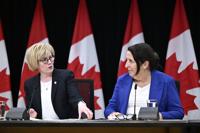TORONTO - Ontario is reversing its expansion of urban boundaries for several communities after finding that processes used by the previous housing minister's office did not meet the government's standards, the new housing minister said Monday.
Paul Calandra said he is reversing course on changes to official boundaries for Barrie, Belleville, Guelph, Hamilton, Ottawa and Peterborough.
He is also winding back changes through legislation to official plans for the regional municipalities of Halton, Niagara, Peel, Waterloo, York and Wellington County.
He said he will table the legislation as soon as he can.
"Since becoming minister of municipal affairs and housing, I've made it a priority to review past decisions to ensure that they support our goal of building at least 1.5 million homes and to ensure that the decisions that we made were done in a manner that maintains and reinforces public trust," Calandra said.
"This includes decisions on minister zoning orders and official plans. Now, when reviewing how decisions were made regarding official plans, it is clear that they failed to meet this test."
He said the previous housing minister's office was too involved in changes for those plans.
Calandra said the province will cover costs incurred by municipalities on work done.
Many municipalities, including Hamilton, have said the boundary expansions were not needed to build housing.
Calandra replaced Steve Clark as housing minister last month after the former minister resigned in the wake of two legislative watchdogs' probes on the decision to remove land for development from the protected Greenbelt.
Ontario recently reversed course on that move and 15 parcels of land are being returned to the Greenbelt. The province had planned to build 50,000 homes on that land.
"This really is a reset for me as a minister to work with my municipal partners so that we can remain focused on working together," Calandra said.
The province maintains its goal on housing is to build 1.5 million homes by 2031.
Hamilton Mayor Andrea Horwath called the reversal "a big victory for our city and for the protection of Hamilton farmland.
"The people of Hamilton fought hard against the changes to our urban boundary, and so I am happy that the provincial government listened to our council and our residents and decided to reverse course," she said in a statement.
She said the city will be able to meet its housing obligations without changes to the urban boundary or the Greenbelt.
Official Opposition and NDP Leader Marit Stiles said the government has wasted a year on housing policies only to reverse them in the face of public outcry.
"Minister Calandra’s latest flip-flop makes it abundantly clear; we have only scratched the surface of the damage this government has done," Stiles wrote in a statement.
"There is a deeply concerning culture of corruption and preferential treatment embedded in how this government makes public policy, and Ontarians deserve more answers."
Interim Liberal Leader John Fraser was incredulous about Calandra's comments that Clark's office was too involved in the changes to municipalities' urban boundary changes.
"There is no way on God's green Earth that the premier's office didn't know about these urban boundary changes, didn't know about MZOs, didn't know about the Greenbelt," he said.
Green Party Leader Mike Schreiner said the government should have been focusing on implementing recommendations from its own housing affordability task force to build homes instead of removing land from the Greenbelt and expanding urban boundaries.
The government says it has implemented 23 of the task force's 74 recommendations, with another 14 in progress.
The RCMP is investigating the province's decision to open up parts of the Greenbelt for housing development.
This report by ºÚÁϳԹÏÍø was first published Oct. 23, 2023.








































